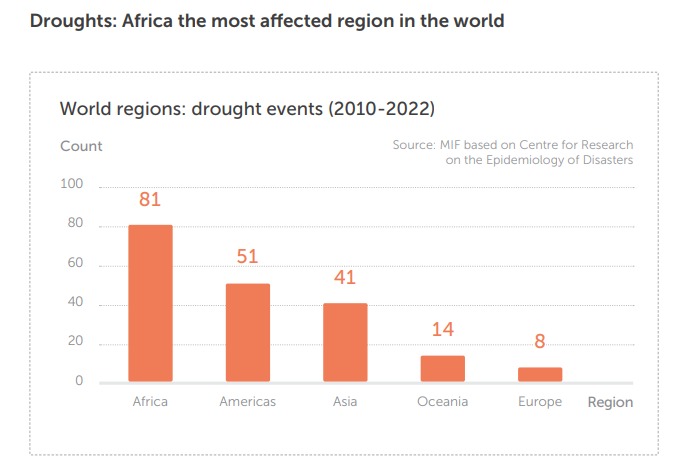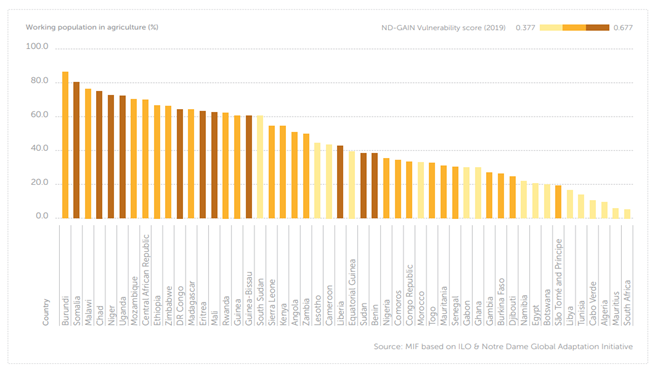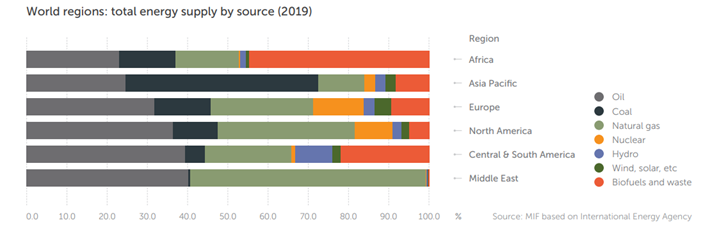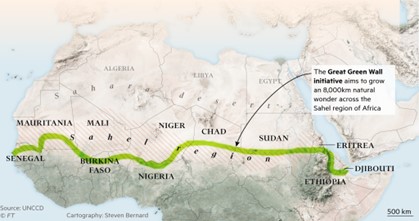As it is known, this year's summit of the United Nations Climate Change (COP 27) will take place in the coastal city of Sharm, located in Egypt's South Sinai Peninsula. While the first leg of the program is expected to start on November 6, it is said that the dialogues will take place within the framework of the African continent. The main topics are listed in a way that almost intimidate the participants; global warming, energy use, drought and green economy are just a few of them. On the other hand, while the summit to be held is expected to give positive messages, Egyptian President El-Sisi said in a statement: “In the past 30 years, the world has come a long way in struggling climate change and its harmful effects. We can now better assess the effects of climate change.”. He also used the phrase for COP 27: "An opportunity to prove our unity against future threats". Before this important summit, MO Ibrahim Foundation published a comprehensive research report to guide the participants. More importantly, it made 15 critical recommendations that will directly guide the decisions to be taken at this summit. In our new article, we will examine the recommendations of the Ibrahim Foundation which are crucial and it mostly puts forward using index data.
COP 27 Summit
So far, many preparations have been made in Egypt. President Sisi's emphasis on "Green Sharm" seems to have mobilized all officials. It seems that the summit will take place in Egypt gives a meaningful message for the African. Again, we will cover this subject in our article, but first, when we look at the latest research: The temperatures in Africa are increasing quite rapidly compared to the rest of the world. According to additional estimates, this increase will continue in the following periods of the 21st century. In particular, African countries are expected to put forward their demands at the COP 27 Summit. The Ibrahim Foundation, on the other hand, addresses the issue with two recommendations: “Consider the interplay between climate, development and security issues” and “Increase the focus on loss compensation.” It also highlights the fact of “Invest to prevent damage to critical infrastructure and vital resources”. In short, these recommendations indicate that attention should be paid to the sensitive points of the African climate. According to the Ibrahim Foundation: Africa has become the continent that pays the highest price despite having the least share in climate change. The consequences of the situation present a more dire reality. Primary, with the continuation of the global warming, 40 million people struggle with extreme poverty in this region, which is located in the south of the Sahara Desert. That area covers almost all countries in the region, and then 80 million people are expected to migrate to a different region. Against such a possibility, Ibrahim Foundation emphasizes the key importance of renewable energy sources. It also emphasizes energy access and security.
An African Fact
Africa is currently the continent with the youngest population in the world. Dramatically: about 60% of the continent's population consists of young people under the age of 25. This means: the workforce and employment capacity are considerably higher than in other regions. Ibrahim Foundation, on the other hand, draws attention to the importance of production on the subject. In particular, infrastructure and necessary distribution suggest expansion and improvement of transport resources. However, we see that potential labor is not fully met here. It is an interesting coincidence which at least 60% of the population in Africa works in the agricultural sector. The agricultural sector is the general livelihood of the continent and has resulted in a stable acceleration of the labor force.
On
the other hand, the fact that the region is still in danger of drought leaves a
question mark in the minds. In addition, experts began to talk bout the
possibility of a devastating flood. The truth is the biggest crisis that awaits
Africa after the drought is described as the "flood disaster".
According to a data in the report, at least 215.3 million people were exposed
to this disaster between 2010 and 2022. In addition, according to the Ibrahim
Foundation index data, Egypt and Burkina Faso are currently at great risk. As
another example, we can handle Ethiopia, which has been struggling with the
worst famine since 1981. Undoubtedly, in this example, we can say that the
floods caused the current negative situation. People on the African continent still
live without basic energy resources. In this sense, energy resources, one of
the important topics of the summit and is also a critical issue for the Ibrahim
Foundation. According to a data in the report, 600 million people in Africa
today live without electricity. When we look at the recommendations regarding
this problem; it has been suggested to raise awareness about the energy
reserves of Africa and to implement the global "green economy" model.
Similarly, it has been suggested to use clean energy sources and to avoid
fossil fuels that harm the environment.
The COP 27 Summit may be a turning point for some steps to be taken in Africa. But it is important to set priorities well. In this sense, the successful conclusion of the talks may give the green light to the development goals of the continent. According to the Ibrahim Foundation, if there is no equitable distribution of energy in Africa, there will be no solution to the climate issue. In other words, for effective governance, the link between the problems must be established. One of the most striking notes in the published report is the section “Possible questions to be asked at COP 27”. The main outstanding issue here is how the participating countries will follow a governance method. In particular, it is a matter of curiosity in which direction the joint steps will be taken in international problems and what measures will be taken by the governments themselves. As it is known, the topic of governance is one of the main issues that Ibrahim Foundation deals with. For this reason, among prominent concepts in the report is the idea of environmentally friendly governance. The advice given in this regard “The idea of generating income from the natural reserves that the continent has is valuable.”. In practice, the most serious example is the duplication and effective use of sinks, which are carbon storage areas. Another suggestion is to give priority to the idea of governance and improve the local economy.
Common Future
The United Nations is returning to Africa after a 6-year again. The last summit held on the continent was in Morocco in 2016. It is obvious that this return has created a great expectation in the region. At the same time, it may be thought-provoking to come together again on climate change in these lands. According to Ibrahim Foundation, “Africa's burden needs to be shared equally by all countries on the continent and to take this as a global responsibility”. Another advice is “Rebuild the trust lost in past summits”. On the other hand, African Union President Macky Sall stated in his statement that his pre-summit expectations were promising and emphasized that African countries should cooperate in the steps to be taken, especially in some important projects. One of them, the “Great Green Wall” project, has drawn all the attention so far. The aim of this project, in which more than 20 African countries work in partnership, is expressed as “To stop the sandstorms towards Africa and to expand the natural beauty extending to the south of the Sahara Desert”. In addition, the wall, which will be built on a huge area of 8,000 km, is expected to contribute to sustainable energy and create jobs for millions of people. The prominent recommendation here is “Provide broad and community-integrated financial solutions to the continent”.
According to
an expert statement in the report: “The repercussions of climate change are
becoming more visible in Africa day by day. But when it comes to taking
responsibility, governments stay silent”. On the other hand, he says that the
African people are ready to make sacrifices against this crisis. Moreover, he
states that people are putting pressure on their governments to fight climate
change. Ibrahim Foundation continues to call for responsibility to the relevant
authorities. It also points out that it is
necessary to take measures to compensate for the damages that may occur. When
we evaluate all these results, we can summarize the question of what can be
done for sustainable life in Africa. At the same time, we can review once again
this report and 15 critical recommendations, which form the basis of the summit
to be held. As in the last recommendation given, we can reflect a humanitarian
perspective on the climate change crisis. As a result, the idea of “a common
future against climate change” is being confirmed as time passes.
Resource: The road to
COP27: Making Africa’s case in the climate debate/ 2022 Forum Report




